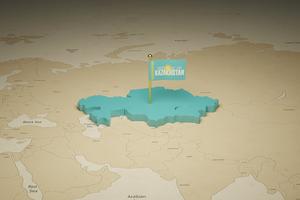Kazakhstan’s Archbishop: Pope Francis’ Visit Will Strengthen Our ‘Little Flock’
Archbishop Tomasz Peta spoke with the Register about the Holy Father’s upcoming Sept. 13-15 visit.

Pope Francis’ Sept. 13-15 visit to Kazakhstan will be especially important for the small Catholic community in the country and will serve to strengthen their faith, the archbishop of Kazakhstan’s largest archdiocese has said.
In a brief Sept. 8 email interview with the Register, Archbishop Tomasz Peta of St. Mary of Astana also predicted that the main reason for the visit — the Seventh Congress of Leaders of World and Traditional Religions that Francis will attend — will help promote lasting peace while avoiding syncretism if a “clear and strong witness” is given.
Almost 100 delegations from 60 countries, including representatives of Christianity, Islam, Judaism, Shintoism, Buddhism, Zoroastrianism, Hinduism and other religions will take part in the triennial event, which Archbishop Peta believes was born out of Pope St. John Paul II’s visit to Kazakhstan in 2001.
According to Bulat Sarsenbayev, chairman of the event’s main coordinating body, the Nazarbayev Center for Development of Interfaith and Intercivilization Dialogue, “four breakout sessions” will be held on the “role of religion in strengthening spiritual and moral values, education, and religious enlightenment, as well as on the support for the social status of women, their contribution to the well-being of society, and countering extremism, radicalism and terrorism, especially of the religious variety.”
Pope Francis arrives in the Kazakh capital of Nur-Sultan (formerly called Astana) next Tuesday evening for his three-day visit to the country. After addressing civil and political leaders shortly after his arrival, the following day he will attend the opening of the interreligious congress where he will deliver an address, and meet the religious leaders before celebrating an open-air Mass in the afternoon.
On Thursday he will hold a private meeting with members of the Society of Jesus in Kazakhstan, address bishops, priests and religious of the country, and then deliver an address at the conclusion of the interreligious congress before boarding the flight back to Rome.
It is possible the Pope may meet Chinese President Xi Jinping during his visit, as Xi is expected to be in the country on Sept. 14 to sign a number of bilateral agreements, according to reports. It was also speculated after the trip was confirmed at the start of August that the Holy Father might meet there with Russian Orthodox Patriarch Kirill, but the Russian Orthodox Church subsequently communicated that Kirill had decided not to attend the interreligious summit.
Catholics of both the Roman and Byzantine rites make up 1.4%-1.7% of the country’s population of almost 20 million, which is predominantly Muslim (70.2%).
Archbishop Peta has served as the head of the local Church, first as apostolic administrator and subsequently as its archbishop, since 1999.
Your Excellency, what are your hopes for the Pope’s visit, especially for the faithful of Kazakhstan?
Each visit of a Pope is a historical event, considering the fact that he is the “Vicar of Christ on earth,” the Successor of St. Peter. This is particularly important for the Catholic community in Kazakhstan, which is a “little flock.” We are convinced that the papal visit will strengthen the faith of the Catholics in our country.
The Pope is attending the Seventh Congress of Leaders of World and Traditional Religions. How important is this initiative for world peace in your view?
St. John Paul II during his stay in Kazakhstan in 2001 pointed to Kazakhstan as to a “place of meeting,” as a “bridge between continents and cultures.” We think that the Congress of Leaders of World and Traditional Religions is one of the fruits of the visit of John Paul II. These congresses indicate to the world the meaning of the faith in God in the personal life and in the life of entire nations. They can be a sign for the truth, that man is created not only for the earthly life, but for eternity. They can also remind people, that true peace is a gift of God and that it requires therefore prayers, that peace is the fruit of prayers. The efforts of the politicians for peace are insufficient.
These interreligious events are sometimes criticized by the faithful for conveying a syncretic approach to the faith and relativizing the one true religion of the Catholic Church. Is this a concern you share, and if so, how could these events be better handled to convey the truth?
The Congress of Religions is a possibility of the witness of truth, to be a witness of Jesus. I remember the statement during one of the previous congresses from the representative of the Vatican, who said that our religion is not the “religion of the book.” It is the meeting with the person of Jesus. Of course, there exists the danger of syncretism, but one has to avoid it through a clear and strong witness.
How could the Pope’s visit help promote peace between Russia and the rest of the world?
The entire world is looking forward with hope that the papal visit will contribute to the end of the war in Ukraine. Humanly spoken it seems very difficult, but “for God nothing is impossible.”
- Keywords:
- pope francis
- kazakhstan
- Archbishop Tomasz Peta

















